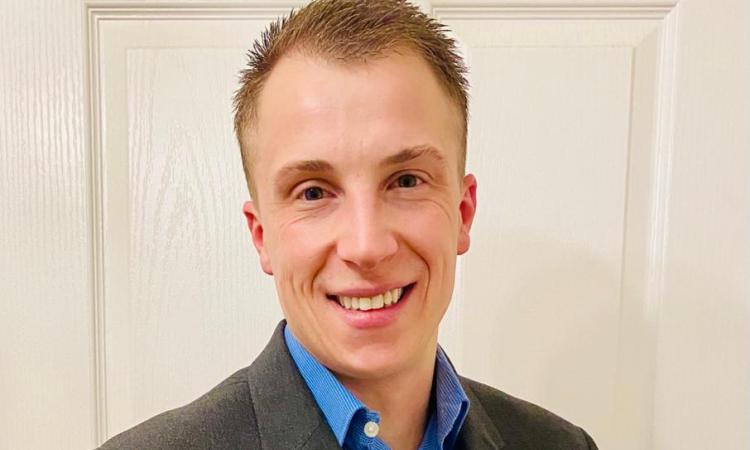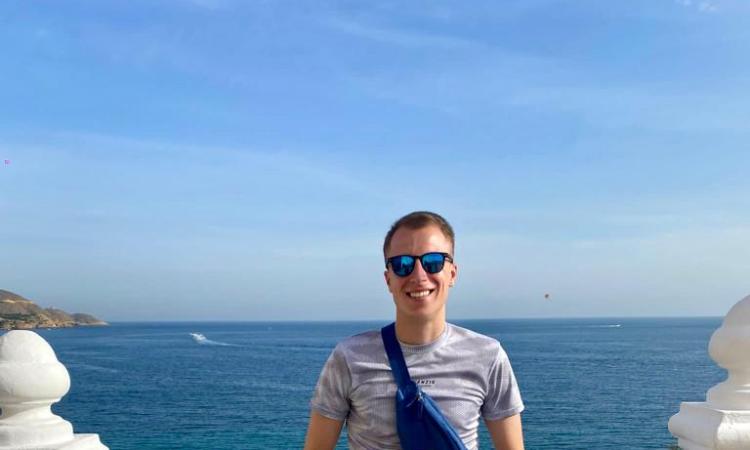James' story
This content mentions eating disorders, body image or generally discusses weight, which some people may find triggering.

It’s ‘Eating Disorder Awareness Week (EDAW)’ from 27 February 2023, and this year’s focus is on eating disorder awareness in men. Yes, that’s us strong, tough men who hide our feelings. Oh, hang on a minute, that’s not actually true, is it?
It’s a myth that it’s only women and girls who suffer with ‘eating disorders’.
The National Association for Males with Eating Disorders estimates that 25% to 40% of people with eating disorders are men and boys. The big blocker to getting help is stigma, together with a lack of understanding about the size and presentation of eating disorders in the male population can mean that eating disorders are not identified or treated early enough.
Of course, it is possible that men and boys are particularly resistant to early intervention. One of the main reasons for this could be a reduced likelihood of family, friends or medical professionals suspecting an eating disorder as early as they would in a female with the same symptoms.
So, this is my story about how I fell victim to the deadly disease ‘Anorexia Nervosa’. Thankfully and luckily, I live to tell the tale and turn my wounds into wisdom. I hope that this will help people who are affected to understand the importance of getting help, no matter what type of eating disorder they may have.
Malnourished to Manpower!
For two years in my early twenties I lived with anorexia but convinced myself that I was fine. Only when my weight dropped, did I finally agree to get the help that I needed. I now raise awareness of the illness to help others.
I was a relatively chubby child, and, as I’m sure you know, kids can be mean. I was bullied at school for the way I looked and, at one point, was even given the nickname ‘Bacon Boy.’
But looking back, it didn’t make me desperately unhappy. Not at the time. It wasn’t like those unkind words made me want to change myself or fit in or triggered an eating disorder. Although, I suppose, in some way, that’s what did happen. It just crept up, surprising me years later when I was 22.
After leaving school, I was happy. I was living at home in Milton Keynes, I studied horticulture and then ended up working for a local company. Everything felt pretty stable. As I got older, I did want to look good and feel better in my skin, so I signed up to the local gym and found that I actually really enjoyed it.
I fell into a good routine; making my own lunch in the morning, going to work and then the gym after that. I lost weight, felt good, and my life as an 18-year-old seemed very normal. Until I got offered a secondment in London which meant being away from home and the familiarity of that entire routine. That’s when things began to change and over those few months away from home, I got used to the feeling of being empty and hungry, and what’s more, I liked it.
What also happened, as I began eating all of my meals alone and doing nothing but work and going to the gym, I began to isolate myself from other people.
I didn’t feel comfortable being around anyone else, having people watch what I was (or wasn’t) eating, so I cut myself off. My work colleagues didn’t really know me, so they didn’t notice much difference, but when I went home after my secondment ended, my family saw that my behaviour had changed.

I kept telling them I was fine. I thought I was. I just wanted to be left alone, and the more they told me to eat, the less I wanted to. But I guess that deep, deep down, I knew things weren’t fine. I remember at the same time thinking that I just wanted to fade away, to not exist, to be gone by the time my sister had her baby, six months later.
However, I pushed those thoughts and feelings down and carried on. There were moments during those months, before my diagnosis, where I was feeling a lot of tension. When you’re malnourished, it plays havoc with your emotions.
I was angry, snappy and volatile. My parents didn’t understand what was happening to me or how to help, how could they when I didn’t know what was happening myself?
When I finally spoke to a GP, they told me that I was severely underweight. You might think that at this point, things would start to look up. But for me, this is where my mental health actually hit rock bottom.
The first thing that happened was that I was signed off work for eight weeks and had to declare my licence to the DVLA as I was considered a risk on the roads. It felt like I was being punished. In fact, worse, it felt like people had taken away my control and were trying to control me.
I was told that I was entitled to 30 weeks of Cognitive Behavioural Therapy. Something that I really didn’t want. It’s hard to explain, but with anorexia you can only start to accept help and get better when you hold your hands up and say, “I need help”. But I still couldn’t do that. I was in complete denial.
My aim then was just to be healthy and for it all to be over - to be left alone. So, I went from being extremely anorexic to binge eating.
I now show myself compassion, and I can give myself a ‘talking to’ when I have thoughts that might not be healthy. Of course, I’ve had setbacks, but over the last eight years I’ve really managed to get myself back on track.
I’m still very aware of what I eat. There’s no doubt about that, but I don’t restrict myself anymore. And on the days that I do indulge, it doesn’t hurt as much as it used to. They helped me see things differently, admit that I ‘did’ need help and recognise that I never want to be back in that painful place again.
People started saying that I looked good and how much ‘healthier’ I must be now that I was gaining weight. What they couldn’t see was the way I was crumbling inside. Even though it’s hard to explain or pinpoint when, why or how the therapy started to help. It just did.
I think when you start to feed yourself physically with food, and mentally with therapy, you get a better perspective and understanding. I learned to recognise the voice in my head - the one telling me that my weight needed to be as low as possible for me to be happy - and change it.
When the therapy ended, the hard work on myself really began, but the treatment had given me the tools to do that, and what’s more, I wanted to.
It’s why I’m now extremely passionate about raising awareness of male eating disorders and talking about how to recognise it in friends and colleagues - and in yourself. Luckily, Cognitive Behavioural Therapy (CBT) helped me, and I’ve turned things around. But I’m very aware that so many people are convincing their friends, family - and themselves - that they’re fine. I hope that by talking about my experience, it will help them.
Things are changing for the better!
Eating disorders continue to have the highest mortality rates of ALL mental illnesses. Yes, all mental illnesses - shocking, I know. There has been much improved training for healthcare professionals over the past year. But we need to see more accurate awareness of the early signs, symptoms and risks of eating disorders, and we need to see more prioritisation of early detection and treatment, especially in men and boys and before medical treatment become necessary.
As someone with lived experience, I strongly believe any related deaths are preventable if people get the right care early enough. Recovery from eating disorders is possible, but getting the right treatment early is key for the sufferer and the increasing strain on our health care system. Eating disorders are a severe mental illness and shouldn’t be underestimated.
And if you could take anything away from my story, it would be the following: “All the advice in the world won’t help, until you are willing to help yourself”. You can and will get better!
If you feel affected by the content you have read, please see our get help page for support.

Read stories about people like you
